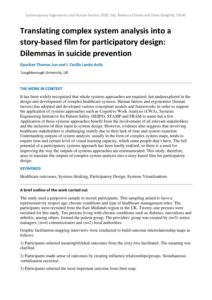| Document | Author Gyuchan Thomas Jun and I. Cecilia Landa-Avila |
| Abstract It has been widely recognised that whole systems approaches are required, but underexplored in the design and development of complex healthcare systems. Human factors and ergonomics (human factors) has adopted and developed various conceptual models and frameworks in order to support the application of systems approaches such as Cognitive Work Analysis (CWA), Systems Engineering Intitiative for Patient Safety (SEIPS), STAMP and FRAM to name but a few. Application of these systems approaches benefit from the involvement of all relevant stakeholders and the inclusion of their input in system design. However, evidence also suggests that involving healthcare stakeholders is challenging mainly due to their lack of time and system expertise. Undertanding outputs of system analysis, usually in the form of complex system maps, tends to require time and certain level of visual learning capacity, which some people don’t have. The full potential of a participatory systems approach has been hardly realised, so there is a need for improving the way the outputs of systems approaches are communicated. This study, therefore, aims to translate the outputs of complex system analysis into a story-based film for participatory design. |

